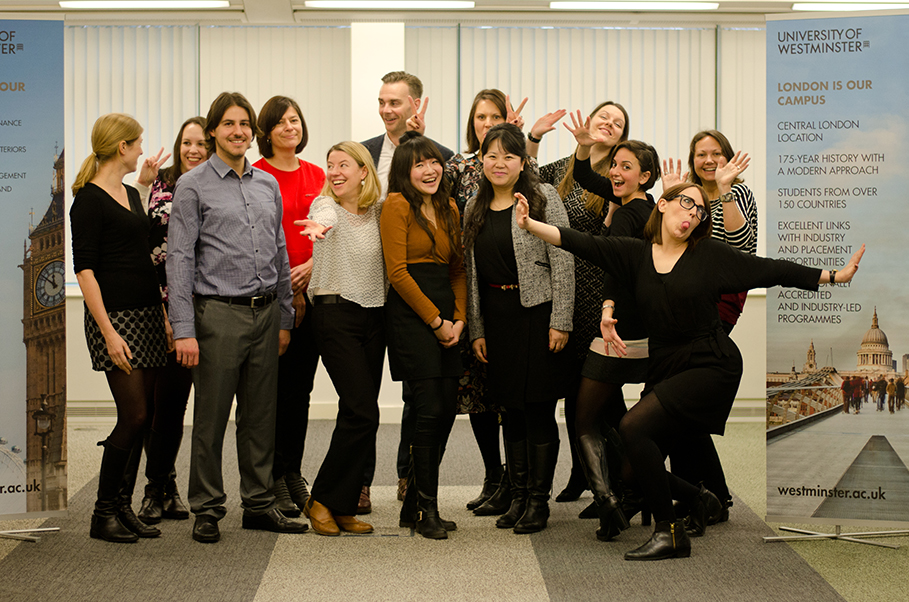Are you looking for a part-time job while studying? Want to boost your CV and earn some money as well? If that’s the case, I’ve written this post to tell you a little bit about my work-study experience and, trust me, it is not that complicated!
Throughout the year, you have several academic assignments which demand a high amount of energy and efforts. The thought of juggling work and studies might seem daunting at first, but, as someone who worked non-stop during the last semester of the course, it is not and nor does it have to be.
So I would like to tell you how I landed a great part-time job which not only supported me financially, but also allowed me to put in practice my skills and meet incredible people. I condensed my journey into three stages with tips and advice, and I hope it helps you to find your dream part-time job too.
- Looking for suitable work and the Talent Bank
I have been working in the International Recruitment Team at the University of Westminster since the second half of my Masters last year. It was initially a 3-month contract, but it was extended and eventually covered the period of classes, exams and my final dissertation altogether.
If you ask me how I got this job within the university, I’d say exactly the same as what I recommended to the September starters: check out the Talent Bank! If you haven’t heard about it, the Talent Bank is a programme which posts paid part-time jobs offered by the university and external companies. They also provide career development support and how to improve your employability skills.
Fortunately, I learned about the Talent Bank at a time when I was struggling to find suitable part-time jobs. Through the programme, I got a 3-week market research job in March for an external project of the University of Westminster. It was a very quick ad-hoc project, so when it ended, I started to look for a longer part-time contract.
I was prioritising jobs which were similar to an internship position, flexible and located close to my university. However, most of the internships are not paid, and the majority of part-time jobs concentrated in retail and catering shifts. Nothing against them, of course, but I wanted to experience how it is to work in a corporate environment in the UK.
- How I got the job and some top interview tips
Luckily for me, in that same month I found an assistant position posted on the Talent Bank website for the International Recruitment team at the university. It was mostly an admin job, but there were tasks which interested me such as liaising with international students and supporting event planning.
So I sent out my CV and cover letter and shortly got an interview opportunity. It was one of the best job interviews I’ve ever had. I felt prepared to answer questions about my skills, gave examples of my previous jobs performances and elaborated on how I could contribute to the position. At the same time, I got along with the recruiters very well, which I believe was the key point for me to be accepted on that job.
If you don’t have many job interview experiences, I’d suggest you to focus on three key words: research, practice and rapport.
First, make sure you are well aware of the job’s scope of work, the company and how your skills match this opportunity. Spare some time to do research prior to the interview. It helps you to keep your mind refreshed for the interview.
Secondly, practice, practice and practice. Training is a vital exercise, especially if you are an international student whose native language is not English. Check out the Career Development Team, schedule mock interviews and rehearse to build up your confidence and relieve anxiety. Emotional preparedness is a key component to make you feel more comfortable during the interview.
Lastly, building a rapport with the interviewer is key to stand out from the competitors and get you closer to that job. At least for me, the most successful interviews I’ve had were the ones in which I “clicked” with the recruiters, so the whole experience felt more like a compelling dialogue rather than a Q&A session.
- My work-study experience for 7 months
One day after the interview, I received an e-mail from the Talent Bank offering me the job. I started to work in the beginning of June.
Looking back, I was very lucky to find this work because it not only had flexible hours, but the team were fantastic and I got to exercise my marcomms skills under an international perspective. My initial scope of work was expanded, so I took part in strategic projects such as the first Alumni Buddy scheme, case studies copywriting and many more. From that standpoint, I was able to manage work and study smoothly without getting overwhelmed.

Of course, there were days, especially towards the end of my course, when I’d leave the office around 6pm to carry on with coursework with my classmates until late hours. It was tiring, but it was fun as well! The truth is: keeping up is the most challenging part, but I never felt I needed to quit my job to focus on my studies.
Summing up, I’d list these three things that will greatly make your work-study balance much easier and smoother:
- The team: make sure that your manager and the team at work understand your academic commitments. And don’t forget to keep them updated about your schedule. Working in a supportive environment made me feel valued and encouraged to balance work-study better.
- The location: London has a very accessible public transport system, but a nearby location does make a difference when you have to commute from university to work and vice-versa every week. When I was looking for jobs in the beginning of the course, most of them were located far from my university. Had I worked in any of those, I would have spent much more time and effort on commuting rather than actually studying or working.
- Time management: plan and allocate time for each activity wisely. If you intend to study in 2 hours, DO IT! I know, there are plenty of distractions, but try your best to follow the rules you set. Be disciplined with yourself and it will pay off. 🙂
My final advice
A part-time job that supports your studies is not easy to find, but it is not impossible either. Keeping up is another challenge, so be prepared to adjust yourself and give up some things, such as going out with your friends after class all the time and studying in the afternoons.
But hey, if you are looking to get some work experience, get paid and raise your employability skills, then get ready to roll up your sleeves and make it happen. London is a great business hub with lots of opportunities, so enjoy it as much as you can! Having been through this enriching experience over the past year, I can only say: “Hello from the other siiiide!”
Hope you find the part-time work you are looking for and see you next time!
- 5 differences between British and Brazilian postgraduate education - June 16, 2018
- Carol and her inspirational journey from Brazil to UK - October 2, 2017
- My career in Brazil one year after graduating from Masters at Westminster - March 17, 2017


